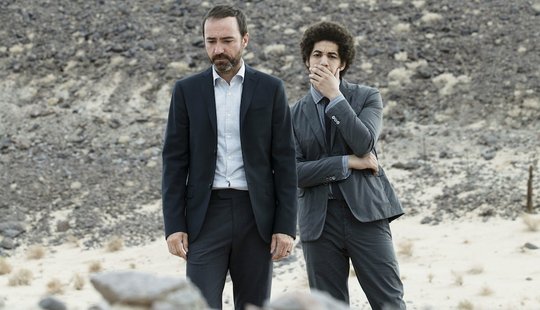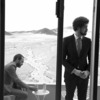I do a lot of interviews over the phone; if I lived in London, I could do most of them in person, which might be some small recompense for needing to forgo eating in order to pay the rent. Given that conference calls are nothing short of the devil’s work, apparently invented exclusively to facilitate people talking over one another, you’ll usually speak to just one member of whichever band you might be writing about.
That wasn’t really an option when it came to talking to Broken Bells, who share a working relationship so symbiotic that I would have felt as if I’d only gotten half an insight into their new record, After the Disco, if I’d chatted with just one of James Mercer or Brian ‘Danger Mouse’ Burton (read Part One here). It’s probably an unlikely pairing on paper, but it’s one that works startlingly well in practice; it’s as if they both get to play some exaggerated version of themselves. Burton finds himself part of a band, rather than assisting one externally, while Mercer - normally constrained to relatively straightforward rock and pop templates with The Shins - can delve into the stranger side of his musical disposition, as he did on the dreamy, eccentric Broken Bells back in 2010.
There’s a touch more nervousness than usual as I wait for the caught-in-traffic Mercer to arrive home and call me back; The Shins were, quite unequivocally, my favourite band through my late teens. With that particular day job currently on the back burner, though, he’s got plenty of time to walk us through After the Disco, a record that stakes an early claim for the year’s most gloriously off-kilter pop record.
JG, DiS: After the Disco seems quite a bit more immediate to me than Broken Bells; were you trying to make things a little poppier this time around?
JM: I had hoped on that, for sure. I felt like we’d done some pretty kooky stuff on the first record, and I’d always been pushing to try to do some more beat-oriented stuff, which was a little bit difficult because Brian’s far more interested in the weirder, downbeat side of things. I think I managed to push some of that through on this one, though.
When did you actually find time to work on the record? Your touring with The Shins seemed to stretch well into 2013.
We really properly got started in the spring, but we’d sort of been working in fits and starts before that. If I had a few weeks off from The Shins, I could maybe take one of those weeks to go down to work with Brian, and we could really get quite a lot done in that time. It was definitely a little bit more of a blur between the two than it was last time. I’d say most of the touring cycle was interwoven with the process of making this album, thinking about it.
Did Brian do any work on it alone, while you were away?
He pretty much just left it on the shelf; he’s a busy guy, so he had all kinds of other stuff to be getting on with. We stuck to the rule of only trying to put things together when we could both be in the same room, and I think it worked out for us. It wasn’t like I was getting down there and a bunch of stuff was already done, and being away on the road, I didn’t really have any kind of downtime to ruminate on it myself anyway. Pretty much all of the good ideas I’ve ever had for Broken Bells have come to me when I’ve been with Brian, actually.
Is the process of working together completely collaborative? I kind of get the impression that the only set role in this band is that you’re the singer.
Yeah, it is. I feel like people still think that I write all the lyrics, and there’s some kind of traditional band structure there; in reality - and especially on this record - Brian actually wrote most of the lyrics. We just get together, do what we need to do, and the roles are really up for grabs. I mean, you say Brian doesn’t sing, but obviously in the studio he’s singing melody ideas back to me and things like that. He could sing, if he wanted to. It isn’t off the table.
Did you feel nervous about writing lyrics with somebody else?
There was a little bit of that. I knew I was excited to do something that I hoped would loosen up the grip that I had on my own creative process, but there’s things you worry about; is it going to be awkward? Are there going to be disagreements we can’t get past? It was unfamiliar territory for me, for sure. Suddenly, there’s a lot more variables, more things you can’t control.
Has collaborating on the lyrics for Broken Bells affected the way you write them for The Shins?
It’s made me want to be more direct. I remember some of the lyrics that Brian wrote for the first Broken Bells record; I was a bit worried about them, because it just wasn’t what I knew to have this stuff that was so on-the-nose, so straightforward. And then, going out and singing them, I kind of realised that the effect of that wasn’t negative at all, it was positive. To be able to just say what you mean, have it work melodically and have it accepted as part of the song - that was a real revelation for me. If you think about ‘For a Fool’, that was on Port of Morrow - that song is super, super direct. I don’t think I ever would’ve written that way for a Shins record before I worked with Brian.
Did you take anything from the experience of making Broken Bells into the last Shins album? You worked with a lot of new people on that record.
I think where I’m really a little bit guarded with the Shins stuff is the actual writing; putting together the melodies and the lyrics. Everything else has always been pretty open - if you’re in the room and you come up with a cool keyboard part, I’ll want to use it. It was pretty similar in that respect on Port of Morrow. The one thing that working with Brian made me want to do is work with a producer; I sort of started to recognise how important that role is. Partly because of how fun the Broken Bells stuff is to make, and partly because I hadn’t realised just how efficient it makes the process. I mean, even if I was to bring Brian some Shins songs, it’d just go so much faster, because he’s so well-versed in what he does. I wanted to have somebody involved who was used to hearing a musician’s ideas and then immediately offering up their own, which is why I brought in Greg Kurstin.
On the album opener, ‘Perfect World’, there’s this breakdown two minutes from the end where everything suddenly slows down; it’s almost like a different song. Was that the result of you both trying to put your own stamp on it?
What happened there was that I was playing the chords on the acoustic guitar really slowly; this was just me messing around after we’d written it. Brian liked the way it sounded, that super stripped down take on it, and had the idea of adding on this kind of coda. He did that on the first record, too; you can hear it on ‘The Mall and Misery’, that little bookend where it descends into a slower, sadder version of the melody. He actually had the idea that we should go all out and include it on every song; taking the After the Disco concept to the extreme, and bringing it into every minute detail. It probably would’ve been a bit much, though.
How much of that concept actually made it onto the finished product? Did you find that the same ideas kept popping up as you were writing the lyrics?
We didn’t write the lyrics until after the music was in place, although that wasn’t intentional; we tried to do them as we went along, but it just didn’t happen. Too much procrastinating, I guess. I don’t think there’s anything all that conceptual, really; it’s more that we were flirting with that idea in the studio. I mean, there were some considerations, like leaving a song or two off because they didn’t fit; I had to fight pretty hard to keep ‘No Matter What You’re Told’ on there, because it’s really quite different to everything else. I just really wanted to be able to put that into the live set. If some really cool concept had kind of emerged, we’d have run with it, but we weren’t really set on making the album that way.
I should probably state for the record that there isn’t really any disco on After the Disco, as popular as that seems to have been lately.
That’s true. We might have missed a trick there. It worked for Daft Punk.
There is some very eighties stuff in there, though. The vocals on ‘Holding On for Life’ sound like pure Bee Gees, to me.
Oh yeah, totally.
Were you actively taking influence from that kind of stuff? Some of the synths you’ve used on this album just inherently tend to have that eighties sound anyway.
For some reason, we were both curious about trying to bring more of an electronic feel to this record. More specifically, we were also wanting to experiment with some of that real eighties, kitschy, synthesizer pop stuff. Like, when I say kitschy, I mean it; I’m talking real mainstream stuff, not Depeche Mode. We wanted to echo that era and see what we could come up with.
‘Holding Out for Life’ actually kind of seems like the outlier on the record, because for the most part there isn’t much of your falsetto on there.
Oh yeah, there’s definitely a lot more of me singing in my speaking voice. I think that might just be what the songs needed. I sort of envy people who don’t get themselves into that situation I’m always in; you know, it’s really kind of an athletic thing to be straining your voice for over an hour on stage, and I wish I was one of those people that manages to write songs that are actually in their goddamn range. I should probably try that.
How far did you feel you were being shifted outside of your comfort zone when you started playing live shows with Broken Bells?
Quite a bit. The major thing was playing with other people, really. At that point, it hadn’t been long since I’d broken out of this kind of co-dependent relationship with my old bandmates, and the experience I had with Broken Bells definitely gave me a lot of confidence to work with other people. It really struck me how professional a lot of musicians are, and how willing they are to work hard.
I seem to remember you kept the touring side of things relatively brief last time out. Was that because you both had other things to focus on?
For Brian, I guess, yeah. It’s more to do with my family for me. If I was single and didn’t have kids, it’d be a lot more fun touring. Being away from them isn’t easy. I do really enjoy it when I’m out doing it, but I kind of dread it in the lead-up to going out on the road. I mean, I’m not under any illusion about how important it is. I love this whole project, and I know touring is a big part of it. Just not my favourite part.
Were you always dead set on going back to The Shins after you’d finished touring the self-titled album? Might you have gone back and made another Broken Bells record straight away?
I was excited to go and do The Shins after we were done touring. I felt so much more prepared for it. I was inspired by working with Brian, and I had new confidence as far as working with new people was concerned. I used to really be quite insecure about all that; not that I’m super confident now, just more realistic. I know I’m not some super-proficient musician or anything, but I can hold my own with good players and not feel too intimidated. I was definitely ready to turn over a new leaf with The Shins.
I was just thinking about the fact that After the Disco is due out almost seven years to the day that Wincing the Night Away was released, and you’ve actually made more Broken Bells records than Shins ones since. Do you still consider The Shins your primary focus?
I guess it switches back and forth at this point. You know, I’ve put so much work into The Shins. That’s the thing that I feel as if I’ve built up from nothing, and it’s always going to be really important to me. It’s the vehicle for the stuff I write on my own, which I always have done and I think I always will do. That’s such a constant in my life. When I get nervous or scared about the future, or when I get anxiety - which I do, a lot - I know I can get on with doing a productive thing, which at its essence will always be picking up a guitar and writing. So, there’s always going to be songs developing slowly over time, and The Shins is my way of getting them out into the world.
I thought, for the most part, that Port of Morrow was a fairly straightforward record compositionally; do you tend to save the more leftfield ideas you have for Broken Bells?
I do want to go back to being a bit more experimental with The Shins, and revisit the territory that Wincing the Night Away was kind of hinting at. People have been saying to me that I should produce the next record myself, but I think I’ve found the perfect person to work with on that kind of album - Richard Swift, who’s been in the touring band with us. He seems to be able to tap into that more experimental side of things. I really like the idea of having that nice symmetry; him being in the band, but also understanding where I want to go with the ideas I’m bringing in. He’s a collaborator who knows where I’m coming from, which is exciting.
Would you ever consider trying your hand at production yourself?
I think I’d like to. What’s difficult is, it’s not what I come from. Brian’s got two engineers that he has a wonderful relationship with, and it’s amazing to see how fast they make ideas become reality. That’s what I want to develop, but I’m not sure if I could emulate what Brian does. You have to marvel at the way he gets things done with people; he’s got a very unique personality.
What’s the plan for the immediate future? Are you going to be on the road with Broken Bells for most of 2014?
I think there’s plenty of stuff lined up. It depends a little bit on how well the record’s received. If we feel like we’re not really growing at all, we might just do the important stuff and then reassess it. If it’s going great, I guess the ball will keep rolling.
Do you have any idea of what you’ll be working on next? I noticed a post on The Shins’ Instagram page recently that suggested there might be new stuff on the horizon...
That was just me getting together with Swift, Yuuki [Matthews] and Joe [Plummer] and doing a little work - just keeping things going and throwing some ideas around. I think we’ll use that stuff for something, but we’re not going to put anything out that would conflict with the Broken Bells schedule.
Would you consider making another Broken Bells record straight away, or is that the kind of thing that Brian’s schedule might curtail?
The thing is, we can get stuff done so quickly. We could do it. If we cut the touring short, we could get back together in October and start on another record. It wouldn’t be impossible, but I guess I don’t know what we’ll both want to do once we’re done promoting this album. It could happen if we could break out of that regular cycle of release, then touring, but that’s a lot easier said than done.
Read Part One of our interview with Broken Bells here.
After the Disco is out this week via Columbia Records. Broken Bells play one UK date on their European tour:
24th March, Shepherd’s Bush Empire, LONDON























